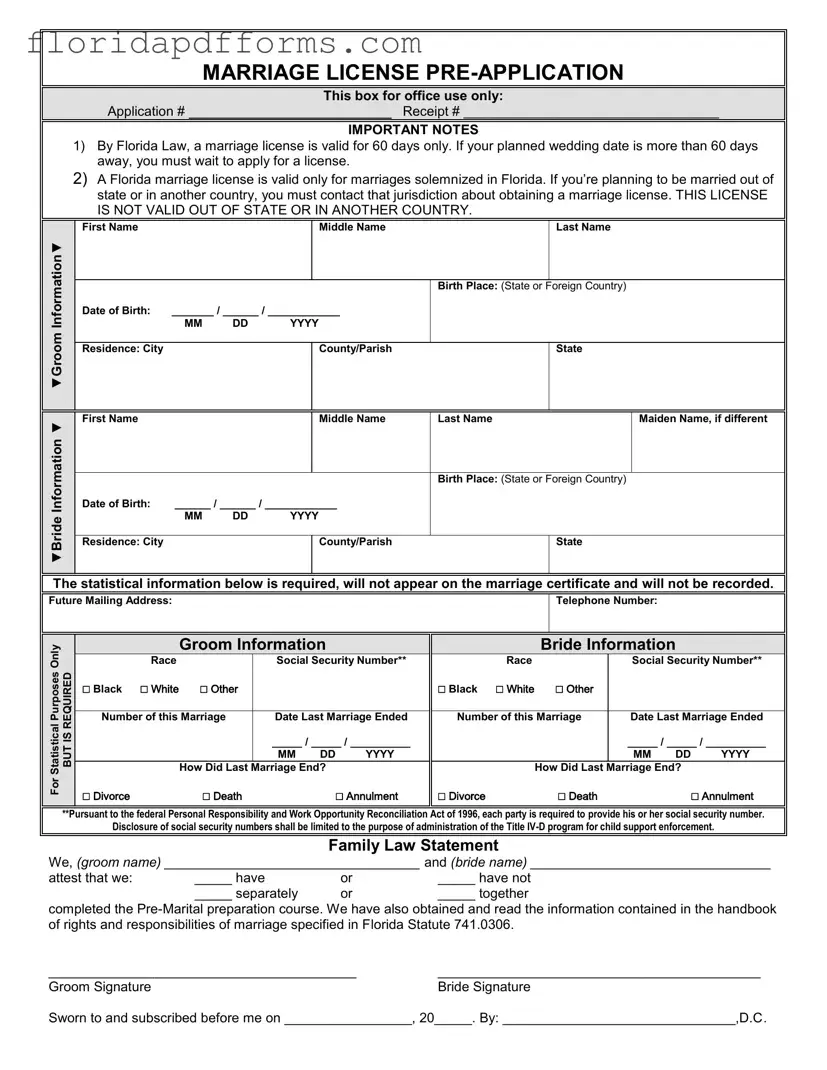The Florida Marriage Application form shares similarities with the marriage license application used in California. Both documents require personal information from the individuals, such as names, birth dates, and places of residence. In California, applicants must also disclose their Social Security numbers, similar to Florida's requirement. Each application serves the same purpose: to obtain a legal license to marry, and both have specific validity periods for the licenses issued.
Another comparable document is the marriage license application in New York. Like Florida, New York's application collects essential details about both parties, including their names, ages, and identification information. Both states require that applicants declare any previous marriages and their resolutions. Additionally, both applications emphasize the importance of understanding the legal implications of marriage, often providing resources or information on rights and responsibilities.
The Texas Marriage License Application is also similar in structure and purpose. It requires personal identification details, including full names, birth dates, and Social Security numbers. Both forms ask about previous marriages and their endings, ensuring that applicants are eligible to remarry. Texas, like Florida, issues a marriage license that is valid for a limited time, reinforcing the need for timely application.
In Illinois, the marriage license application reflects similar requirements. Applicants must provide their names, addresses, and birth information. The Illinois form also asks for details about prior marriages, ensuring that both parties are legally free to marry. Both Illinois and Florida emphasize the necessity of understanding marriage laws and responsibilities, often including informational resources.
The Ohio Marriage License Application presents comparable features as well. It collects personal information such as names and birth dates, similar to Florida's form. Both applications require information regarding previous marriages and their resolutions. Additionally, Ohio's application includes a section for applicants to confirm they have received information about their rights and responsibilities in marriage, aligning with Florida's approach.
In Georgia, the marriage license application mirrors Florida's by requesting essential information about the couple. This includes full names, birth dates, and previous marriage details. Both states require applicants to provide their Social Security numbers. Furthermore, Georgia’s application outlines the legal framework surrounding marriage, akin to the information provided in Florida's application.
The Massachusetts Marriage License Application also aligns closely with Florida's form. It requires personal details from both parties, including names and birth information. Both documents ask for information regarding previous marriages and their resolutions. Massachusetts, like Florida, emphasizes the importance of understanding marriage laws and often provides resources for couples to review before applying.
Finally, the Washington State Marriage License Application shares similarities with Florida's application. Both documents require detailed personal information, including names, birth dates, and residence addresses. Each application also addresses previous marriages, ensuring that applicants are eligible to marry. Washington’s application reinforces the importance of understanding the legal aspects of marriage, similar to Florida's approach.



 ▼Bride Information ▼
▼Bride Information ▼